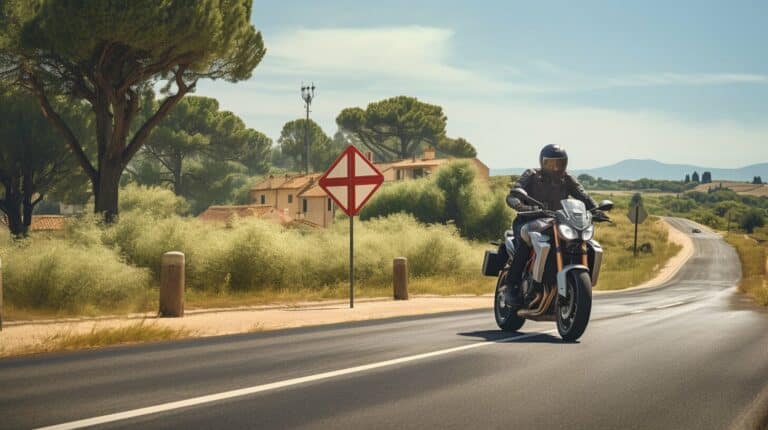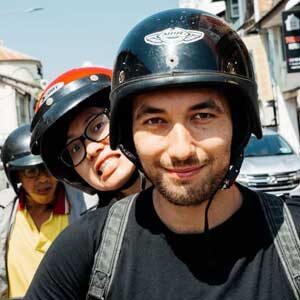Planning a motorcycle trip in France? Make sure you’re well-prepared with these 20 essential tips and laws.
Here are some tips and laws to know before taking a motorcycle trip in France:
- When approaching roundabouts, give way to traffic already on the roundabout and use your indicators to signal your next move.
- Traffic coming from the right generally has priority, so be cautious when riding on main roads with intersections.
- Familiarize yourself with the different road signs in France to know the rules.
- On French toll roads, use the booth on the far right and carry a credit card or cash for payment.
- The speed limits in France are 50 km/h in town, 90 km/h outside town, and 110 km/h or 130 km/h on motorways depending on the region.
By following these tips and laws, you can have a safe and enjoyable motorcycle trip in France.
Familiarize yourself with French road signs and rules
Before hitting the road, it’s crucial to familiarize yourself with the road signs and rules in France. Understanding and following these signs and rules will not only keep you safe but also ensure compliance with local regulations.
In France, road signs play a vital role in guiding drivers and motorcyclists. These signs convey important information about speed limits, directions, hazards, and more. Take the time to study and memorize the different road signs you may encounter during your motorcycle trip.
In addition to road signs, it’s essential to be aware of the rules that govern French roads. For example, when approaching a roundabout, always yield to the traffic already on the roundabout and use your indicators to signal your next move. Similarly, be cautious when riding on main roads with intersections, as traffic coming from the right generally has priority.
| Tips for Familiarizing Yourself with French Road Signs and Rules |
|---|
| Study and memorize the different road signs in France. |
| Follow the correct procedures when approaching roundabouts and intersections. |
| Be cautious of traffic coming from the right and yield when necessary. |
| Observe and adhere to the speed limits indicated by road signs. |
| Stay updated with any changes or updates to French road regulations. |
By familiarizing yourself with French road signs and rules, you can navigate the roads with confidence and ensure a safe and enjoyable motorcycle trip in France.
Navigating Roundabouts and Intersections Safely
When it comes to roundabouts and intersections, knowing the right way to navigate them can make your motorcycle trip in France much safer. Here are some essential tips and safety laws to keep in mind:
- Give way to traffic already on the roundabout and use your indicators to signal your next move.
- Be cautious when riding on main roads with intersections, as traffic coming from the right generally has priority.
It is vital to familiarize yourself with the different road signs in France to understand the rules. This knowledge will help you navigate these areas confidently and avoid any potential accidents or misunderstandings.
Additionally, it’s essential to be aware of other road users and practice defensive riding techniques. Always anticipate the movements of other vehicles and be prepared to react accordingly. By staying alert and following the correct procedures, you can ensure a safe and seamless journey through roundabouts and intersections during your motorcycle trip in France.
| Tips for Navigating Roundabouts and Intersections Safely | Safety Laws for Motorcycle Trips in France |
|---|---|
| Give way to traffic on the roundabout | French law requires motorcycles to yield to traffic already on the roundabout. |
| Use indicators to signal your next move | By law, riders must use their indicators to indicate their intentions to other road users. |
| Be cautious when riding on main roads with intersections | French traffic laws prioritize vehicles coming from the right in most situations, so riders should exercise caution when approaching intersections. |
Understanding French Speed Limits and Road Regulations
Before revving up your engine, familiarize yourself with the speed limits and road regulations in France. Knowing and following these laws is essential for a safe and enjoyable motorcycle trip. Here are some must-know tips and laws to keep in mind:
- Speed limits: In France, the speed limits vary depending on the type of road. It is important to adhere to these limits to avoid fines and ensure your safety. The general speed limits are 50 km/h in urban areas, 90 km/h on non-urban roads, and 110 km/h or 130 km/h on motorways, depending on the region.
- Priority rules: Traffic coming from the right generally has priority in France. Be cautious when riding on main roads with intersections and always yield to vehicles already on the road.
- Toll roads: If you plan to travel on toll roads, use the booth on the far right. It is advisable to carry a credit card or cash for payment, as some toll booths do not accept foreign debit cards.
- Riding etiquette: Follow proper riding etiquette and be courteous to other drivers. Always thank cars that give you the right of way, as it promotes a positive and harmonious road experience.
- Parking regulations: In the South of France, it is allowed to park motorcycles on the pavement as long as it does not obstruct pedestrians. However, be sure to check local regulations and signage for any specific parking restrictions.
Being aware of these laws and regulations will help you navigate the roads in France safely and confidently. Whether you are cruising along the coastal roads or exploring the beautiful countryside, staying informed and following the rules will make your motorcycle trip a memorable adventure.
| Speed Limits | Priority Rules | Toll Roads | Riding Etiquette | Parking Regulations |
|---|---|---|---|---|
| 50 km/h (urban) | Give way to traffic from the right | Use the rightmost booth | Be courteous to other drivers | Park on the pavement, if allowed |
| 90 km/h (non-urban) | Yield to vehicles on the road | Carry credit card or cash for payment | Thank cars that give you right of way | Check local parking regulations |
| 110 km/h or 130 km/h (motorways) |
Parking and Fueling Up in France
Knowing where and how to park your motorcycle, as well as the best ways to fuel up, can enhance your motorcycle trip experience in France. Here are some tips to keep in mind:
Parking:
When it comes to parking your motorcycle in France, it’s important to adhere to local regulations. While parking on the pavement is allowed in the South of France as long as it doesn’t obstruct pedestrians, it’s always a good idea to look for designated parking areas or secure parking lots. This will help ensure the safety of your motorcycle and give you peace of mind while exploring the beautiful French countryside.
Fueling:
When it’s time to refuel, it’s important to know that many petrol stations in France are unmanned. Therefore, it’s advisable to carry a chip-enabled credit card or cash for payment. Additionally, be sure to fill up your motorcycle with premium 98-octane petrol to ensure optimal performance. And while it may seem obvious, always double-check that you’re filling up with petrol and not diesel to avoid potentially costly and inconvenient mishaps on your journey.
By following these parking and fueling tips, you’ll be well-prepared to navigate the roads of France with ease and enjoy a seamless and unforgettable motorcycle trip.
| Parking Tips | Fueling Tips |
|---|---|
| – Look for designated parking areas | – Carry a chip-enabled credit card or cash for payment |
| – Avoid obstructing pedestrians | – Fill up with premium 98-octane petrol |
| – Use secure parking lots when available | – Double-check that you’re using petrol, not diesel |
Etiquette and Safety on French Roads
Riding with etiquette and prioritizing safety on French roads is key to a successful motorcycle trip. When riding in France, it is important to be aware of and adhere to the local road rules and regulations. By following these guidelines, you can ensure not only your own safety but also the safety of others on the road.
Here are some tips to keep in mind:
- Always give way to traffic already on the roundabout and use your indicators to signal your next move. This allows other drivers to anticipate your actions and reduces the risk of accidents.
- Be cautious when riding on main roads with intersections, as traffic coming from the right generally has priority. Stay alert and observe the right-of-way rules to avoid any potential collisions.
- Follow proper riding etiquette and thank cars that give you the right of way. Showing appreciation for other drivers’ consideration promotes a positive atmosphere on the road.
- Be aware of slippery surfaces, especially when it rains or when riding over painted road surfaces. Adjust your riding style accordingly to maintain control and prevent accidents.
| Tips for Etiquette and Safety | Summary |
|---|---|
| Always give way at roundabouts and use indicators | Promotes smooth traffic flow and reduces the risk of collisions |
| Be cautious at intersections, giving priority to traffic from the right | Ensures compliance with right-of-way rules and prevents accidents |
| Show appreciation for other drivers’ consideration | Fosters a positive atmosphere on the road and encourages safe driving |
| Stay alert for slippery surfaces and adjust riding style accordingly | Maintains control and reduces the risk of accidents, especially in adverse weather conditions |
By adhering to these etiquette and safety tips, you can contribute to a pleasant and accident-free experience while riding your motorcycle in France. Respect for the rules of the road and consideration for fellow drivers are crucial for a successful and enjoyable trip.
Documentation and Legal Requirements
Before embarking on your motorcycle trip in France, ensure you have all the necessary documentation and meet the legal requirements. It’s important to have these in order to avoid any issues or penalties during your journey. Here is a list of essential documents you should carry:
- A valid passport.
- The V5C logbook for your motorcycle.
- Your driving license that covers you for riding in Europe.
- An insurance certificate that provides coverage for your trip.
- The European Health Insurance Card (EHIC) for healthcare coverage.
It’s also crucial to be aware of the legal regulations in France. Here are some important laws to keep in mind:
Speed Limits:
The speed limits in France are as follows:
| Road Type | Speed Limit |
|---|---|
| Town/City | 50 km/h |
| Rural Roads | 90 km/h |
| Motorways | 110 km/h or 130 km/h, depending on the region |
Equipment:
While reflective gear and breathalyzers are no longer mandatory in France, it’s still recommended to carry reflective clothing and a breathalyzer kit for your own safety.
Other Regulations:
Be mindful of the regulations regarding radar detectors, dipped headlights, and wearing approved motorcycle gloves. It’s important to comply with these regulations to avoid any legal issues.
By ensuring you have all the necessary documents and meet the legal requirements, you can have a hassle-free and enjoyable motorcycle trip in France. Remember to always ride responsibly and respect the local laws.
Bike Maintenance and Breakdown Insurance
To ensure a smooth and worry-free motorcycle trip in France, don’t forget to prioritize bike maintenance and consider breakdown insurance. Taking care of your bike before your trip will help prevent unexpected issues on the road, while breakdown insurance can provide peace of mind in case of emergencies.
Here are some essential bike maintenance tips to keep in mind:
- Check your tires regularly for proper inflation and tread wear. Ensure they are in good condition to handle different road surfaces.
- Inspect your brakes and make sure they are functioning correctly. Replace worn brake pads or discs to maintain optimum stopping power.
- Check your lights, indicators, and horn to ensure they are all in working order. Visibility on the road is crucial for your safety.
- Keep your chain clean and properly lubricated. A well-maintained chain will improve your bike’s performance and extend its lifespan.
- Inspect your engine oil and coolant levels. Top up or replace fluids as needed to ensure optimal engine performance.
Additionally, breakdown insurance can provide valuable assistance when facing mechanical issues or accidents on the road. It can cover expenses such as towing, roadside repairs, and even accommodation if your bike becomes unrideable. Before your trip, research and compare different breakdown insurance options to find the best coverage for your needs.
| Benefits of Breakdown Insurance | Key Considerations |
|---|---|
| 24/7 emergency assistance | Choose a reputable breakdown service provider |
| Towing service to the nearest repair shop | Review the coverage limits and exclusions |
| Roadside repairs by qualified mechanics | Understand the claim process and documentation requirements |
| Alternate transportation or accommodation | Consider the cost of the insurance premium and deductible |
By prioritizing bike maintenance and having breakdown insurance, you can minimize the risk of unexpected breakdowns and address any issues promptly. This way, you’ll be able to fully enjoy your motorcycle trip in France without unnecessary worries.
Road rules and regulations to keep in mind
Familiarizing yourself with the specific road rules and regulations in France is crucial for a safe and enjoyable motorcycle trip. Here are some important laws and tips to bear in mind:
- When approaching roundabouts, always give way to traffic already on the roundabout. Make sure to use your indicators to signal your next move, allowing other drivers to anticipate your actions.
- In France, traffic coming from the right generally has priority, so exercise caution when riding on main roads with intersections. Always be prepared to yield to vehicles approaching from the right.
- It is essential to familiarize yourself with the various road signs in France. Understanding these signs will help you navigate the roads safely and ensure compliance with the rules of the country.
- When traveling on toll roads, be sure to use the booth on the far right. Additionally, carry a credit card or cash for payment, as these are the accepted methods of payment at toll booths.
It’s worth noting that France has specific speed limits in place. These limits are as follows: 50 km/h in towns, 90 km/h outside towns, and either 110 km/h or 130 km/h on motorways, depending on the region you are in.
| Speed Limit | Location |
|---|---|
| 50 km/h | Towns |
| 90 km/h | Outside towns |
| 110 km/h or 130 km/h | Motorways |
When it comes to parking your motorcycle in France, it is generally allowed to park on the pavement in the South of France as long as it does not obstruct pedestrians. However, be sure to check local regulations in the area you are visiting.
Lastly, always be cautious of slippery road surfaces, particularly during rainy weather or when riding over painted road surfaces. These surfaces can significantly reduce traction, so adjust your speed accordingly.
Are the Tips and Laws for Motorcycle Trips in Italy and France Similar?
When comparing tips for motorcycle trips in italy and France, it’s important to note that while both countries offer breathtaking landscapes and vibrant cultures, there are some differences in regulations. In Italy, it’s mandatory to wear reflective gear at night, whereas in France it’s required to carry a breathalyzer kit. Despite these variations, both countries encourage riders to be aware of road conditions, respect speed limits, and enjoy the exhilarating experience of exploring their picturesque countryside.
Conclusion
By taking the time to understand these 20 tips and laws for your motorcycle trip in France, you can ensure a safe and unforgettable adventure on the roads.
When exploring the beautiful roads of France, it is crucial to familiarize yourself with the rules and regulations specific to the country. Adhering to these laws will not only keep you safe but also ensure a hassle-free journey.
As you navigate roundabouts and intersections, remember to give way to traffic already on the roundabout and always use your indicators to signal your next move. Be cautious when riding on main roads with intersections, as traffic coming from the right generally has priority.
It’s important to familiarize yourself with the different road signs in France, as they indicate specific rules and regulations. Understanding these signs will help you navigate the roads with ease and avoid any confusion.
When it comes to fueling up, be aware that many petrol stations in France are unmanned and only accept chip-enabled credit cards or cash. Ensure you have either of these payment methods to avoid any inconvenience during your journey. Additionally, always tank up with premium 98-octane petrol and not diesel.
Lastly, make sure your bike is in good condition and consider having breakdown insurance for peace of mind. Carry essential tools and spare parts if you are capable of performing basic repairs. It’s also important to be aware of laws regarding radar detectors, dipped headlights, and wearing approved motorcycle gloves.
By following these tips and laws, you can have a safe and enjoyable motorcycle trip in France. So, gear up, hit the road, and create memories that will last a lifetime.
FAQ
Q: How should I navigate roundabouts in France?
A: When approaching roundabouts, give way to traffic already on the roundabout and use your indicators to signal your next move.
Q: Who has priority at intersections in France?
A: Traffic coming from the right generally has priority, so be cautious when riding on main roads with intersections.
Q: What should I know about French road signs?
A: Familiarize yourself with the different road signs in France to know the rules.
Q: How do I pay tolls on French roads?
A: On French toll roads, use the booth on the far right and carry a credit card or cash for payment.
Q: What are the speed limits in France?
A: The speed limits in France are 50 km/h in town, 90 km/h outside town, and 110 km/h or 130 km/h on motorways depending on the region.
Q: Can I park my motorcycle on the pavement in France?
A: Parking your motorcycle on the pavement is allowed in the South of France as long as it doesn’t obstruct pedestrians.
Q: What should I be cautious of when riding in wet conditions?
A: Be cautious of slippery surfaces, especially when it rains or when riding over painted road surfaces.
Q: What payment methods are accepted at petrol stations in France?
A: Many petrol stations in France are unmanned and only accept chip-enabled credit cards or cash.
Q: What type of petrol should I use in France?
A: Always tank up with premium 98-octane petrol, not diesel.
Q: How are car drivers in the South of France likely to react to motorcyclists?
A: Car drivers in the South of France are often aware of motorcyclists and may move to the right to allow filtering between lanes.
Q: Should I thank cars that give me the right of way?
A: Yes, follow proper riding etiquette and thank cars that give you the right of way.
Q: What should I do regarding my driving license and insurance before my trip?
A: Check if your UK driving licence covers you for riding in Europe and inform your insurance company about your trip.
Q: What documents should I carry on my motorcycle trip in France?
A: Carry your passport, V5C logbook, driving licence, insurance certificate, and European Health Insurance Card (EHIC).
Q: Are there any mandatory items I need to carry on my motorcycle in France?
A: It’s no longer mandatory to wear reflective kit or carry a breathalyzer in France.
Q: How can I navigate speed cameras and speed traps in France?
A: Know the speed limits in France and be aware of speed cameras and manned speed traps.
Q: Is there any additional requirement to enter certain areas in France?
A: Check the emissions regulations and get a Crit’Air sticker if required to enter certain areas.
Q: How can I ensure my motorcycle is roadworthy during my trip?
A: Ensure your bike is roadworthy and consider breakdown insurance for peace of mind.
Q: Should I carry any tools or spare parts on my motorcycle trip?
A: Carry essential tools and spare parts if you’re capable of performing basic repairs.
Q: What road rules should I keep in mind while riding in France?
A: Follow the rules of the road, especially regarding right of way and roundabout navigation.
Q: Are there any laws regarding radar detectors and headlights in France?
A: Be aware of laws regarding radar detectors, dipped headlights, and wearing approved motorcycle gloves.






